Luke Coutinho’s Tips to Give Yourself a Healthy Start in 2022
Luke Coutinho, an award-winning life coach who practices in the field of integrative lifestyle medicine, tells Anand Raj OK how by making small but important lifestyle changes, we can reap major health benefits.
(One of the changes is so simple you can do it literally with your eyes closed!)
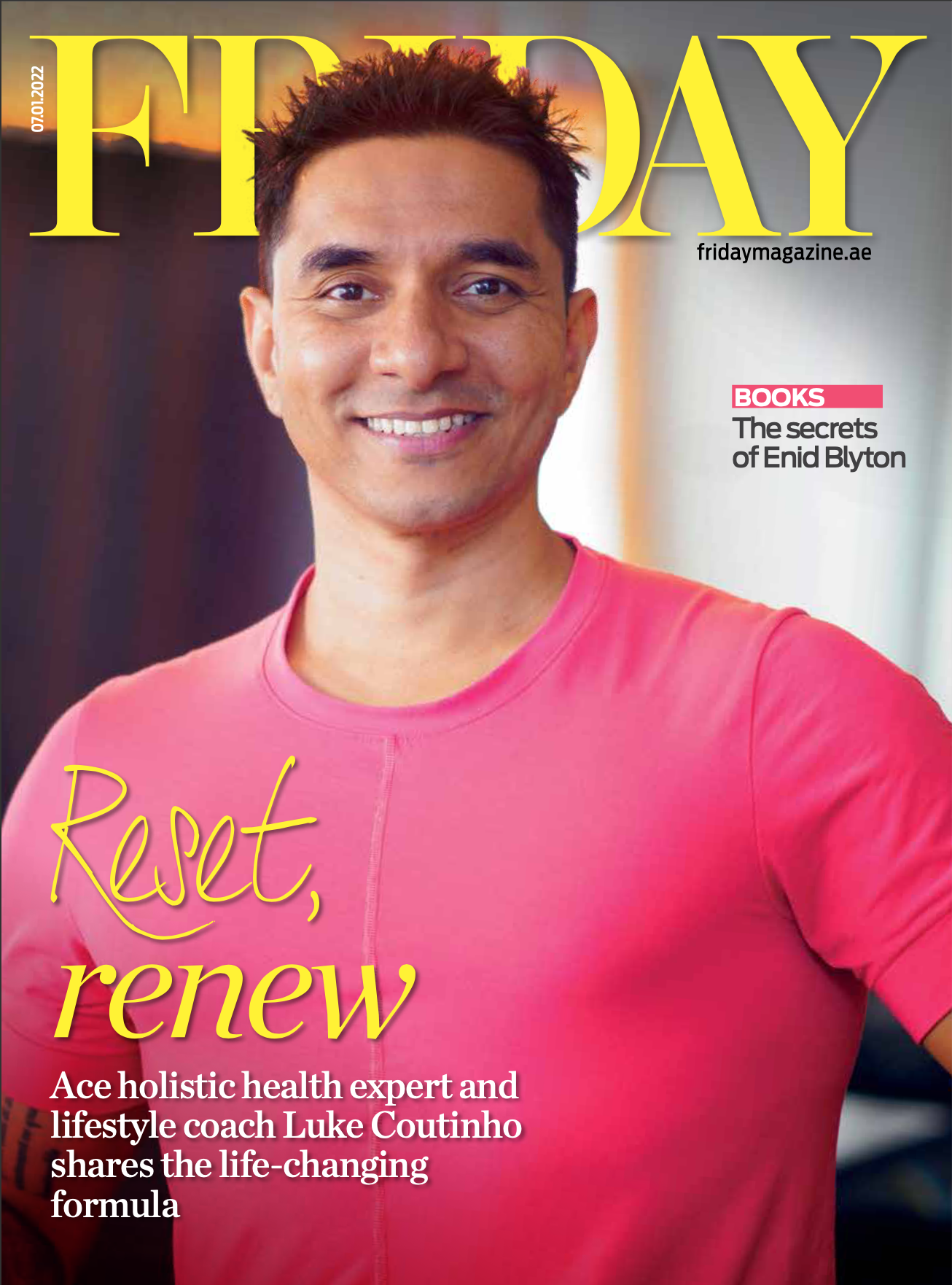 Luke on the cover of Friday Magazine. Photo Credit: Friday Magazine
Luke on the cover of Friday Magazine. Photo Credit: Friday Magazine
Dressed in a red tee that showcases his perfectly-toned upper body, while also revealing a large tattoo snaking up his well-built forearm, Luke Coutinho, a warm and welcoming smile on his face, is a picture of health and wellness when we meet for a chat.
In Dubai recently to speak to students at the Global Indian International School, the hugely popular holistic wellness coach (he has over 435k followers on Instagram and close to 54k on Twitter, not to mention legions of followers across the world) is a name to reckon with in the field of integrative lifestyle medicine and life coaching.
That Luke is popular and his advice on living healthy is much appreciated was evident to me when at a get-together with a few friends a day before the interview I happened to mention that I was going to meet him. Almost instantly, I was deluged with requests from friends and their spouses pleading if they could accompany me ‘just to meet him. (The last time I experienced such a moment was when I told some friends I was going to interview Shahrukh Khan!)
An award-winning holistic nutritionist, Luke, who travels around the world offering personalized consultations, is also the go-to person for conducting lifestyle coaching programs and workshops on prevention and healing for adults and children. Based in India, his Luke Coutinho Holistic Healing System has a set of experts in nutrition, pregnancy care, renal care, allopathy, homeopathy, and yoga, who offer patients personalized treatment programs.’
I am keen to ask him, among other things, what we can do to ensure we start – and continue – the new year in a healthy way, particularly after living a couple of years in the shadow of a pandemic.
Using a simplistic, commonsensical, and back-to-nature approach to tackle lifestyle and health conditions, he makes it clear that prevention and healing essentially revolve around four important pillars: deep cellular nutrition, adequate exercise, quality sleep, and emotional detox. Third, he cannot underscore enough.
“But before we even discuss those pillars one thing I must make clear is that everything in the human body is interconnected. So when you are treating cardiac-related conditions, you need to look at not just the heart but the kidney, the liver, the gut… everything else,” says the life coach.
That said, he highlights the importance of maintaining a healthy gut. “The gut is known as the second brain,” he says, adding it has a major role to play in the smooth functioning of various organs of the body. “If there is an inflammation in the gut, it could surely affect another part of the body.”
Similarly, if for instance, the heart is struggling with an inflammatory condition related to imbalances in triglyceride levels, you need to examine how the gut is processing the food you are consuming.
The gut, he tells me patting his washboard stomach, has a colony of good bacteria and bad. The human gastrointestinal microbiota is home to a complex ecosystem of approximately 300 to 500 bacterial species with each having a function to break down foods.
So if you have an antibiotic, the gut bacteria hold back a bit of the antibiotic to replicate and study it so the next time it gets the medication, it gets smarter developing some resistance to the antibiotic, says Luke. The point he makes is to be prudent when taking antibiotics. But of course, if your doctor prescribes it for you, you must follow his advice, he says.
Consuming greasy foodstuffs, foods cooked in the wrong kinds of oils, among other things can lead to inflammation in the body that can, in turn, lead to cardiovascular problems, diabetes, Alzheimer’s, even cancers, he says.
Sugar, the culprit
Sugar is the other culprit. “White sugar feeds the wrong bacteria,” he says. “A little sugar like in your tea is okay. But if you have a doughnut, a slice of cake, and a thick, sweet milkshake or a sweet coffee, problems could crop up.” The combination of a sedentary lifestyle and a sugar-rich diet is a recipe for gut problems.
Healthier options are jaggery (gur), raw honey, or stevia. Again he warns that diabetics need to keep a strict watch on their intake of any kind of sweetener.
Good sleep matters
Since Luke makes it clear that quality sleep is a crucial element for good health, I ask him how it is related to gut health.
“If you are sleep-deprived, it affects your gut health and vice versa, and this happens because of the connection between your gut and your brain that I mentioned,” he says.
When we are in deep sleep, the body begins performing its repair functions. Apart from detoxification and rejuvenation, it also triggers growth hormones, rebalances bacteria cultures and hormones, and repairs cells.
But if you deprive the body of sleep, you halt or disrupt all these functions causing untold stress on the system. Cravings, bloating, acidity, constipation, indigestion are just some of the fallouts of a body that is sleep deprived.
Without a doubt, if there is one resolution you can make this year, it should be to sleep at the right time and, as importantly, wake up at the right time, ensuring your body has 7-8 hours of uninterrupted, quality sleep.
Those suffering from sleep-related issues must first examine their lifestyle and consider making improvements to it. “You have to decide you want to sleep better and train your body for it,” he says. Start getting into bed at a fixed time – 9, 10, or latest 11 pm – and wake up after a restful 7 hours of sleep. “Your body needs to get used to a cycle.”
He suggests quitting watching TV and keeping aside digital devices at least an hour before your scheduled sleep time. Read a book, write your diary or just meditate on some of the pleasant incidents or moments of the day or the week.
Interestingly, the good news is that it takes just 3 or 4 days to reset the body’s sleep-and-wake rhythm.
“If you do it diligently, it’s possible,” says Luke, with a smile. “But most people give up on the second or third day. Train yourself for just 4 days and it will become a habit.”
What about weekends? Can one sleep a little later on those days? I plead.
“It’s all about balance,” says the life coach. “Skipping a day or two in a week to go out and enjoy yourself is fine. Importantly, do not feel guilty about it. But stick to your schedule the rest of the days and your body will adapt to your new lifestyle.”
The effect of lack of sleep can cause untold health issues in women, says Luke. “Women who are sleep-deprived can end up with hormonal imbalances that could manifest as a polycystic ovarian disease (PCOD) and endometriosis, among other health conditions.”
Stress and mental health
Stress is another major factor that can cause havoc to the body.
According to Luke, when a person is under chronic and continuous stress, their estrogen level goes up. This slows down metabolism affecting the gut, which in turn, upsets the hormone balance that can cause not just physiological conditions but also affect mental health.
“I’m not talking about minor stresses but emotional trauma,” clarifies Luke.
“For instance, the constant negativity that you experience when you are working in a place you don’t like. This can lead to anger issues, resentment, guilt. Such people might appear to be healthy as they may be exercising regularly and eating properly. However, because of stress-related issues, their hormonal balance may be off. The point is one needs to have a holistic approach because everything in the body is interconnected.”
With meditation becoming popular in recent times, I ask him how far it can help in alleviating stress.
“Meditation can help you feel calm and give your mind some rest,” he says. “But it alone cannot solve the problems you may be facing.”
If there is a problem you need to take measures to fix it, he says, and offers some tips on how to go about it. Ask yourself questions such as: “Should/can I accept it or let go of it? Is there a solution? Why is this problem affecting me so much? Why am I getting so emotional about the issue?”
The answers you arrive at can point you to solving the problem.
Stress, he says, is never about a person, thing, or event. “It is about how you relate to it. So if you learn to change your relationship with that, if you learn to accept certain things in a relationship, or with your body, then that acceptance can alleviate the stress immediately.”
Emotions such as revenge and anger are reactions to something. Revenge is an emotion that might make you feel good if you carry it out. But if you pause to be mindful and begin to consider if you truly are going to get anything out of it, or whether there is any point in feeling that way… if you stop giving it your energy, your stress can come down.
Gut health, he says, is inextricably linked to mental well-being. “If there’s any problem with gut health, mental issues can be magnified. Small problems will appear as major ones. When this happens you begin to get anxious and this could set you on a vicious cycle.”
So would he advise people to undergo a gut cleanse?
Not everyone needs to do that, he says. “All you need to do is to eat right.
The body has the ability to clean itself on its own. So even if you eat the worst food the body will clean it out but you need to take measures to ensure you are not continuing to eat the same kind of harmful foods and taxing the body.”
Anxiety comes from fear, helplessness, stress, or frustration, says Luke, stressing that it is possible to change the way you feel, by changing the way you think. “Make a conscious effort to change your thoughts.”
As we come to the end of the interview, I ask him to suggest five things one should do in their lifestyle. He suggests six:
• Have an early dinner.
• Chew your food well and relish what you are eating. Eat local and organic produce, and stick to staple foods.
• Get adequate sleep and wake up at sunrise.
• Exercise daily. Practice pranayama.
• Have gratitude. Whatever phase you may be going through in your life, there will surely be something to be grateful for.
• And avoid focusing on negativity.
Tips for quality sleep
1. No gadgets one hour before your scheduled time of sleep because the blue light suppresses melatonin- a hormone that plays a key role in the sleep-wake cycle.
2. Keep your room as dark as possible. The darker your room, the sooner you are likely to fall asleep.
3. Do deep breathing exercises for a few minutes. Left nostril breathing – a pranayama technique- can help calm you down and prepare you for sleep.
4. A lot of people struggle to fall asleep because they keep thinking about the things to do the next day. Writing down what you plan to do the next day can help a great deal because that way your mind is cleared and you will be more relaxed to fall asleep.
5. Select a wake-up time and stick to it no matter what time you go to sleep
Fasting is good
Fasting, says Luke, is good for the system. “But it should be done smartly and only after consulting your doctor.”
He terms it intermittent circadian rhythm fasting. It can be from sunset to sunrise when you do not consume any food, thus giving the gut and the digestion system a break during which the body cleanses itself.
Luke highlights certain pointers when undertaking intermittent fasting:
Do not consider it as a fad and listen to your body. If it is telling you to stop fasting and consume food, do that. Don’t attempt to do more hours simply because your friend can or is doing so. Do not consider it as a competition.
This kind of fasting can be done once or twice a week, but don’t force yourself to.
Workouts
For those who struggle to find time for workouts, Luke has a solution. “Fitting in a regimented fitness routine might be difficult for some and I suggest them to focus on ‘movement’,” he says.
The easiest way? Stand up and stretch every 15 or 20 minutes if you have a desk job. If you can add a couple of squats, even better. You can take a short walk while taking calls on your mobile. “These kinds of movements take barely three minutes to do every hour.”
(This article written by Anand Raj OK was published in the Friday Magazine on January 7, 2022. Read it here.)
Check out the magazine spread here.
|
From a pimple to cancer, our You Care Wellness Program helps you find a way Talk to our integrative team of experts today 18001020253 |

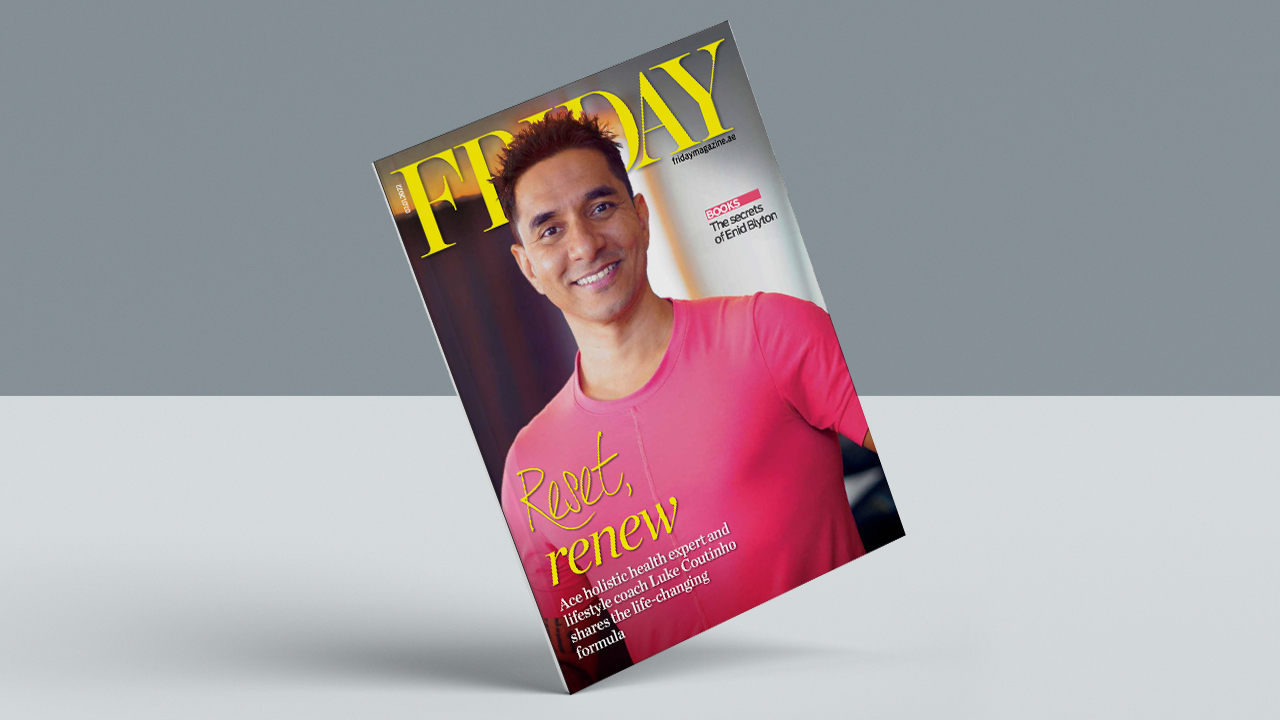
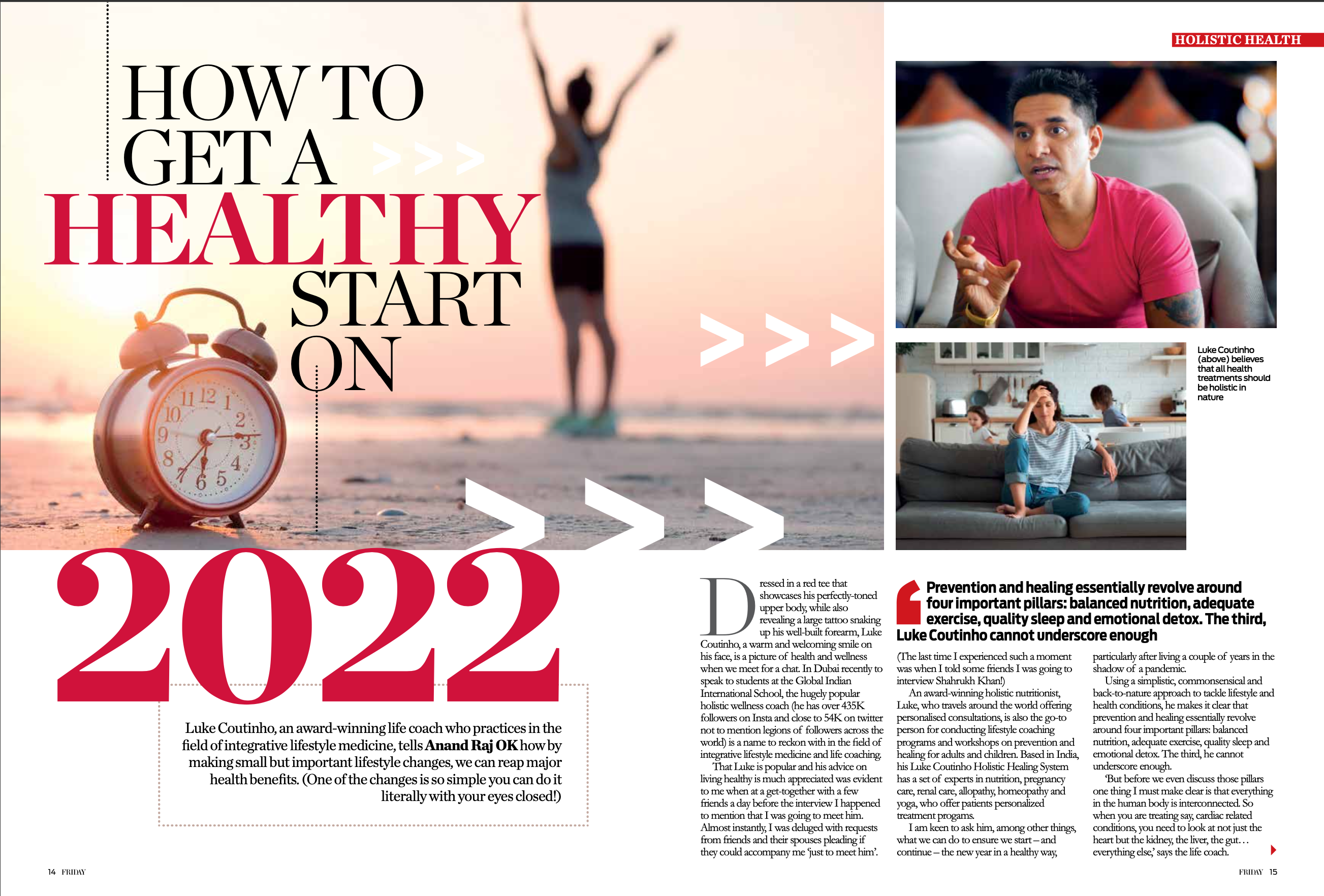
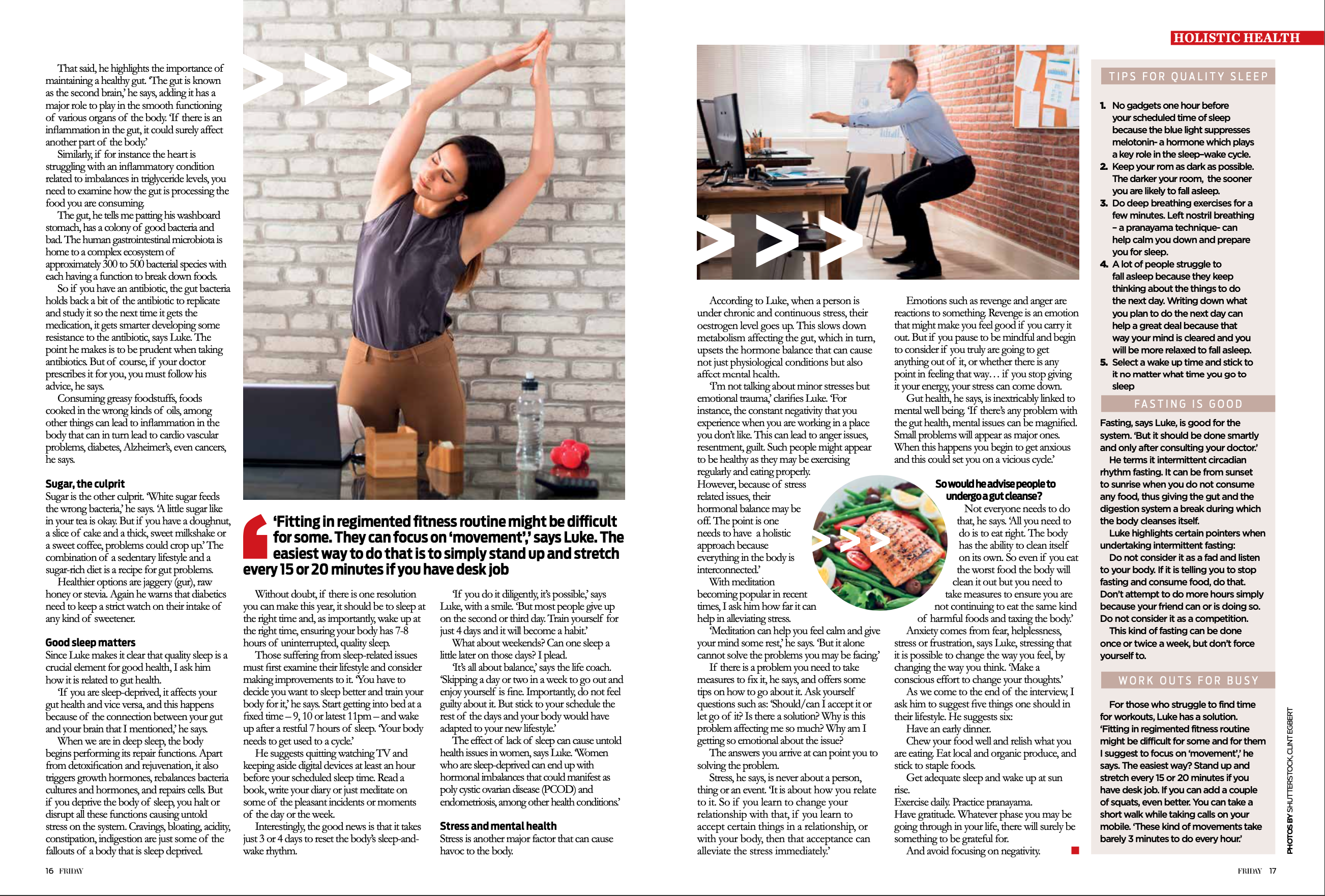

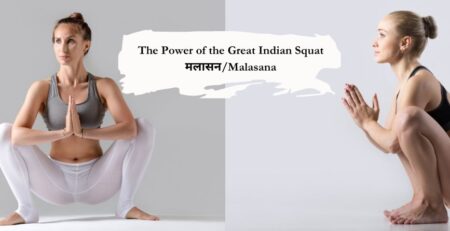
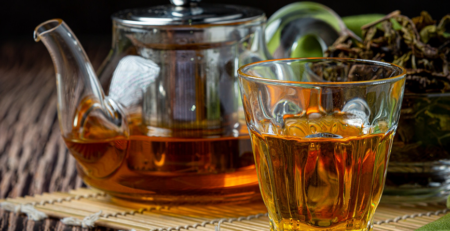



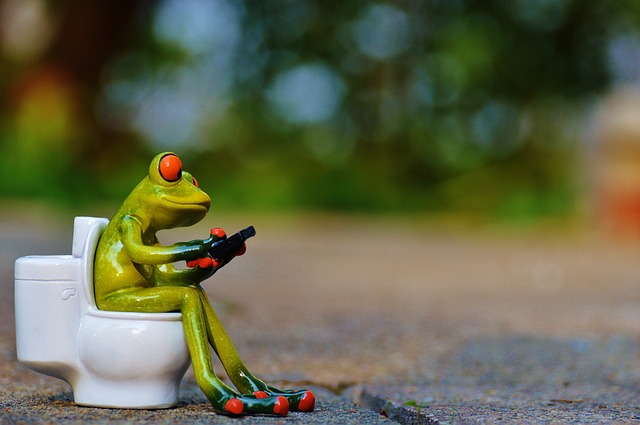
Leave a Reply